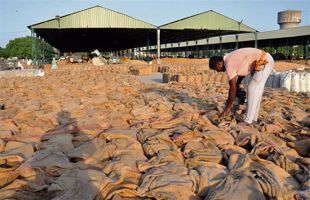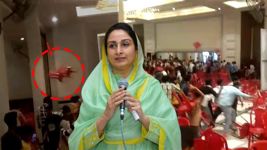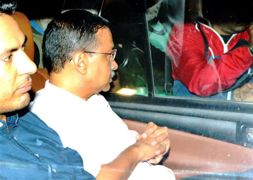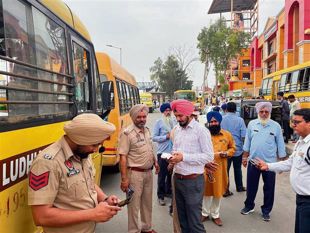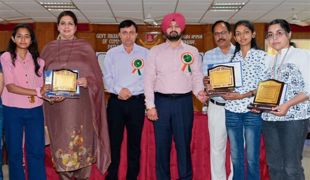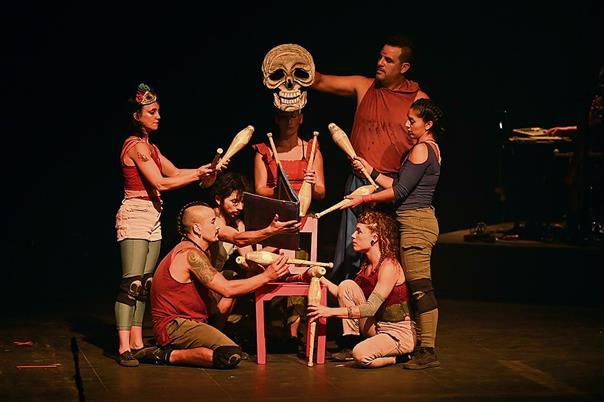
Chilean play ‘Fuego Rojo’ is part-carnivalesque, part-circus, part-acrobatics, but sharply political.
Neelam Mansingh Chowdhry
“The purpose of art festivals is to wash the dust of daily life off our souls.”
— Pablo Picasso
The 21st century is exploding before us with its unending wars, civilisational polarisation, terrifying brutality and human suffering. Can theatre events, art fairs, film festivals and literary happenings replace the overwhelming fear that some of us feel? Does the celebration of the arts become a moment of respite in the maddening violence that we are surrounded by?
How are festivals curated? Is it shopping for exotica, or dipping into other cultures, or cultural trafficking, as some cynics term it? Or is it a genuine need to cross boundaries and take a leap of faith in ways of seeing and viewing, to experience something unusual, something unfamiliar?
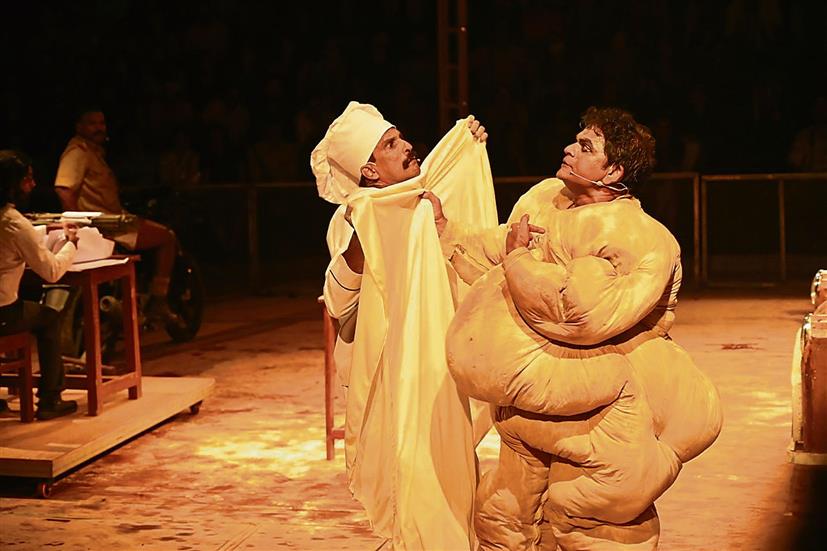 Deepan Sivaraman’s ‘Ubu Roi’ is an adaptation of Alfred Jarry’s 1896 play.
Deepan Sivaraman’s ‘Ubu Roi’ is an adaptation of Alfred Jarry’s 1896 play.Festivals can be seen as a splendid reversal from the quotidian, a break from the routinisation of life, by helping us re-imagine reality not only as an idea, but also as an experience that we can sense and feel. This, hopefully, helps in healing frayed nerves and reaffirming our faith in life. Sometimes, I wonder if it is only temporary amnesia, as art can be hard and cruel by showing us a mirror that amplifies what we are trying to evade.
This charged environment — that can be located in a warehouse, a community centre or in the human heart — becomes the site where people gather, converse and work through contesting realities. This becomes the space where burning truths are spoken fearlessly through visual material, performance, songs and dance.
The world of art has a dual impact: resonance and dissonance. At times, they overlap, separate and loop into different directions but manage to get untangled through metaphors and symbols.
At a festival in Thrissur, after watching Deepan Sivaraman’s ‘Ubu Roi’, a play written by Alfred Jarry in 1896, I understood why the work was considered a precursor to Dadaism, surrealism and futuristic theatre. This was a text brimming with wild roguishness. All rules and cultural norms that existed were upended, impacting both cinema and visual arts. He opened the doors to what is now called modernism.
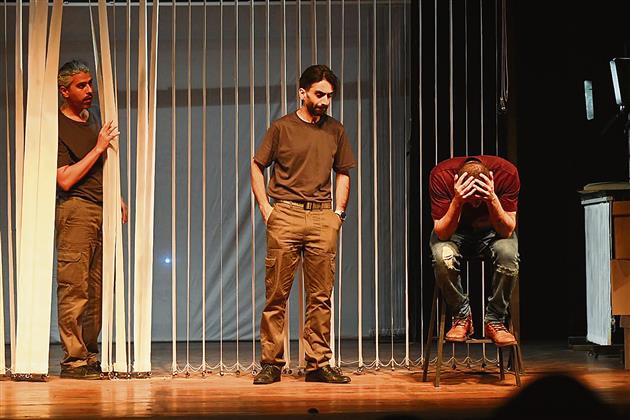 .
.
I remember my student days in Delhi in the mid-1970s, where we eagerly awaited the Shriram Shankarlal Music Festival. It started as a celebration on August 15, 1947, when India first breathed the air of freedom. This particular soiree was planned in a private house in Delhi with musicians and dancers. In a spontaneous display of joyousness, an impromptu dance and music recital burst forth between chairs and tables, not only to mark the joys of being released from the shackles of colonialism, but also as an expression of free minds celebrating the spirt of azadi. It was at that moment of Independence that the music festival was born and continues to enthral Delhi audiences.
I have noticed that film festivals, literary festivals, art fairs and theatre festivals, especially in the days of technology, can become catalysts to dissolve the emotional isolation that exists within us. Most communication these days is largely limited to social media. While watching a film or a play or a work of art, does it create a place for dialogue? I have seen people, unknown to each other, connect in festivals, whether they agree on what the film is trying to say or not. This dialogue is only generated when we see a film, a piece of art or theatre together as a community. And it’s this dialogue that enthuses me, disappoints me, makes me laugh or gets me into a passionate defence. Suddenly, people talk to each other, while mobile phones remain in pockets of jeans or handbags. There is eye contact, there are pauses, there are words. A festival provides the space for conversation with past histories and present realities in a provocative, inventive and sharp way.
Chandigarh is a wonderfully designed city with many magical spaces that can be transformed into unusual art galleries, performance spaces, poetry readings and pop concerts. On my evening walks around the city, I see unusual architectural marvels, whether in an underground parking lot, or an evocative crevice under the varied hidden bridges, the lush green parks, all waiting to be transformed into improvised art spaces.
Why does a festival hold us in its thrall and who is it meant for? How one rushes to festivals in these distressing times is a question I ponder over. When we enter a festival space, literary, visual or performative, what happens? Are we entering a journey within ourselves while grappling with the outside world, trying to make sense, seek answers about the world we live in? I am not sure I have the answers, but the quest is there.
Festivals have the transformative power to make us lift our heads and eyes, mind and hearts, and shout, ‘Hey, let’s enter into each other’s world.’
An unusual encounter at a theatre festival recently was with a documentary play from Palestine in collaboration with Israeli playwright Einat Weizman from Tel Aviv on the theme of ‘How to Make Revolution’. It was a stinging narrative of artistes coming together with a sense of shared grief, with a hard-hitting testimony of an unwavering sense of truth in the face of complex and compelling forces. The Israeli playwright and the Palestinian activist played themselves in a mock trial that made me prosaically wonder how they managed their visa and travel.
Art festivals, Serendipity in Goa or the Jaipur Literature Festival or the Festival d’ Avignon, have the same zing as Diwali or X-mas, but they can’t go on forever. A saturation points sets in and exhaustion follows. Fortunately, my recent experience at the Thrissur festival ended on a thrilling note with ‘Fuego Rojo’, a play from Chile that was part-carnivalesque, part-circus, part-acrobatics, but sharply political. A rustic opera that appeared like a mirage, stunning me and the audience with its virtuosity and courage.
Festivals are more than a mere gathering of artistes and spectators. These are a testament to the power of storytelling, a vibrant fabric woven from the threads of diversity and inclusivity. At the heart of every festival is a belief in the transformative potential of the arts that finds its fullest expression in a festival setting. In this transitory space, artistes meet as migratory birds, in a spirit of collaboration that transcends the boundaries of language, culture and nationality, becoming a powerful reminder of our shared humanity.
Join Whatsapp Channel of The Tribune for latest updates.





















